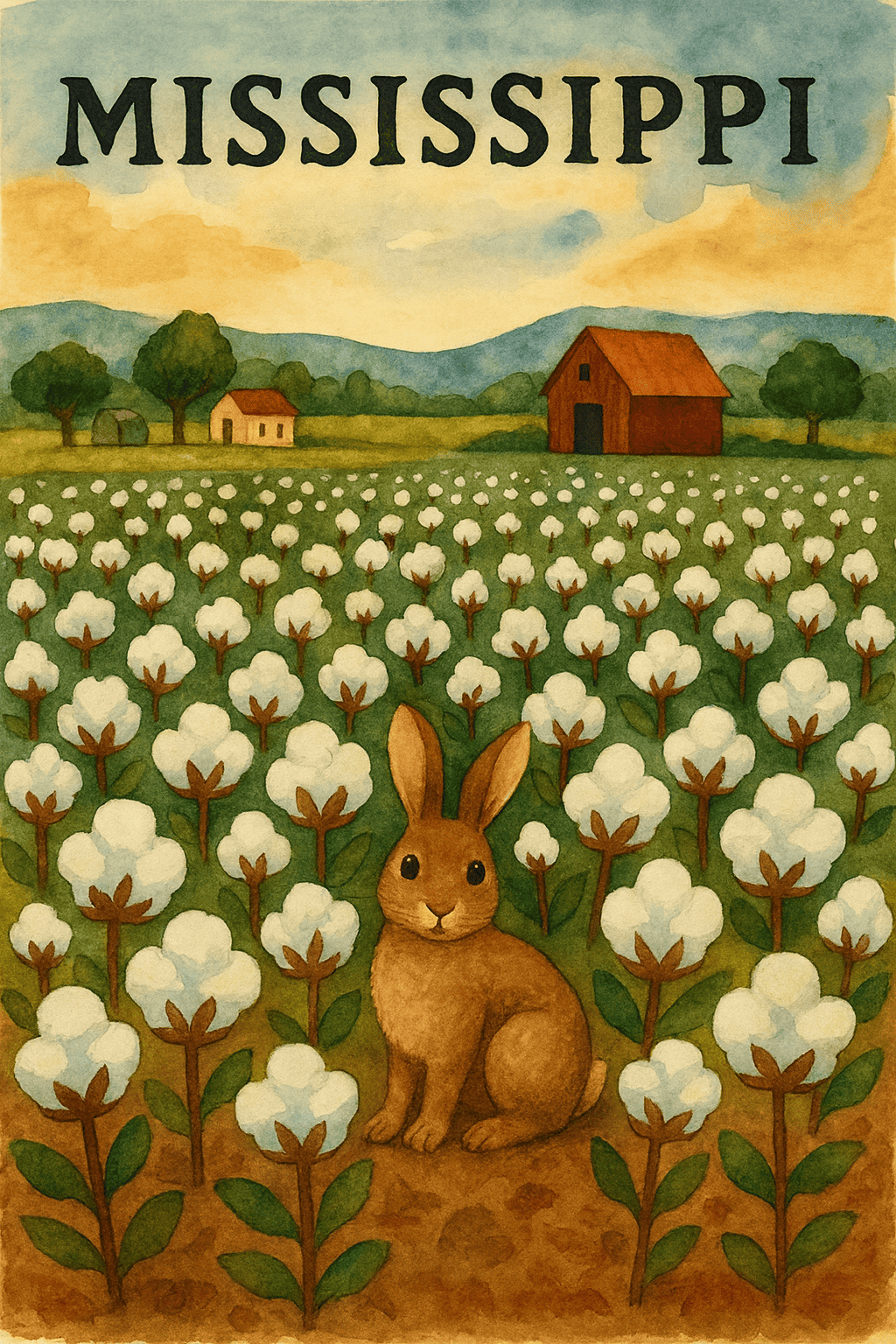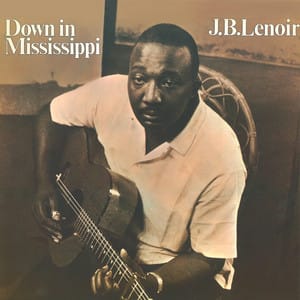Down in Mississippi: J.B. Lenoir and the Sound of Southern Truth

I first heard the name J.B. Lenoir not from a blues documentary or history book—but through a song by John Mayall & the Bluesbreakers. I was in college, constantly digging for hidden gems and forgotten legends, when a friend played a track called “The Death of J.B. Lenoir” off Mayall’s 1967 album Crusade. “You’ve got to hear this,” he said. And he was right—the song hit me in a way I wasn’t expecting. I immediately asked myself: Who was J.B. Lenoir? Somehow, despite all my musical exploring, he had escaped my radar. Curious as ever, I went looking—and what I found changed the way I understood the blues.
One of the first songs I discovered was “Alabama Blues,” and that title alone caught my attention—my mother is from Alabama. I’d spent time there visiting family and had a deep respect for the state’s complicated history—from the 16th Street Baptist Church bombing to the Selma to Montgomery march led by Dr. King. When I heard Lenoir’s voice—high-pitched, raw, and unfiltered—I didn’t just hear music. I heard testimony. His guitar playing was simple but piercing. His lyrics painted scenes that felt painfully familiar, not only to the South but to the experiences of Foundational Black Americans. That discovery led me deeper into his catalog, eventually bringing me to one of his most powerful songs: “Down in Mississippi.” That’s the song I want to talk about today.
J.B. Lenoir may not have been the flashiest guitarist or the most widely recognized name in blues history, but he holds a vital place in the canon as one of the genre’s most courageous and uncompromising voices. While many bluesmen sang of broken hearts, bad luck, and long nights at the juke joint, Lenoir turned his focus toward something far more dangerous: the system. He sang openly about the racial violence, poverty, and injustice that plagued the lives of Foundational Black Americans. Born in 1929 in Monticello, Mississippi, Lenoir came of age under the brutal grip of Jim Crow. The blues he inherited wasn’t just a musical tradition; it was a survival tool, a coded language of resistance, a form of truth-telling. But unlike others who cloaked their messages in metaphor, Lenoir spoke plainly. He didn’t whisper about oppression—he called it out by name.
In songs like “Alabama Blues,” J.B. Lenoir doesn’t hold back—he calls out police brutality and segregation by name. In “Vietnam Blues,” he questions the hypocrisy of sending Black men to fight and die for a country that denied them basic rights at home. And in “Down in Mississippi,” he offers a raw, autobiographical account of racial violence, poverty, and the exploitation of Black labor. Through these songs, Lenoir pushed the blues into bold, uncharted political territory. At a time when speaking out could mean being silenced, blacklisted, or worse, he refused to back down. He stayed true to his message—even if it meant leaving the country to record music that American labels were too afraid to touch.
“Down in Mississippi” is more than just a blues song—it’s a haunting, autobiographical confession from a man who endured the brutal realities of the Jim Crow South and chose to sing the truth. Recorded by J.B. Lenoir in 1966, the track strips the blues down to its rawest form: no electric guitar, no horns, no booming rhythm section. Just Lenoir’s high, aching voice and the hollow strum of his acoustic guitar. The guitar does double duty—serving as both melody and rhythm—while the beat remains subtle, almost ghostlike. You might catch the faint sound of hand percussion or foot tapping in the background, courtesy of Fred Below, the legendary drummer who also played on Chuck Berry’s “Johnny B. Goode.”
Despite its stripped-down setup, “Down in Mississippi” hits harder than most full-band protest anthems of its time. Lenoir’s voice is unlike the gritty baritone growls typical of Chicago blues—it’s high-pitched, thin, and plaintive, more reminiscent of a folk singer than a juke joint shouter. That quality gives the song an added layer of vulnerability and urgency. Instead of raising his volume, Lenoir leans into key words with emotional intensity, using a kind of vocal cry that cuts straight to the soul. It’s not just music- it’s testimony.
The song opens with Lenoir’s stark recollection:
Far as back as I can remember
I either had to plough or hoe
One of those long old nine feet sacks
Standin' at the old turn row
There’s no metaphor here—just lived experience. Lenoir’s use of first-person, autobiographical storytelling turns the blues into both a personal testimony and a public indictment. He’s not crafting a character or spinning folklore; he’s recounting the reality of Black labor under Jim Crow. These lines capture the backbreaking work of generations of Black Americans who toiled in the fields, rarely—if ever—receiving fair compensation for their labor. It’s not just a memory—it’s a record of exploitation.
One of the most chilling moments in “Down in Mississippi” comes when Lenoir delivers the following lines:
They had a huntin' season on a rabbit
If you shoot him you went to jail
The season was always open on me
Nobody needed no bail
This isn’t just clever lyricism—it’s a devastating indictment of how little Black life was valued under the Jim Crow system. Lenoir draws a brutal contrast: even a rabbit, a small and voiceless animal, was afforded more legal protection than a Black man in Mississippi. To harm a rabbit out of season brought punishment. But to kill a Black person? That was open season—with no legal consequence, no accountability, and certainly no justice.
For Foundational Black Americans, these lines hit deep. They speak to the lived reality of generations who endured lynchings, beatings, state-sanctioned violence, and a legal system that was never meant to protect them. From Emmett Till to the countless unnamed victims buried in unmarked graves, the message was clear: Black lives were disposable in the eyes of the white power structure.
Lenoir’s verse functions as both historical documentation and poetic resistance. In just four lines, he exposes the racial double standard of American law, the cruelty of normalized violence, and the psychological toll of living under constant threat. This is more than a song lyric—it’s a mirror held up to America’s sins, and a reminder that the trauma of Jim Crow still echoes in the DNA of FBA communities.
On her 2007 critically acclaimed album We’ll Never Turn Back, Mavis Staples revisits J.B. Lenoir’s “Down in Mississippi”—but she doesn’t just cover it, she reclaims it. Through the lens of gospel, lived resistance, and generational memory, Mavis transforms Lenoir’s stark blues lament into a soul-stirring testimony of survival and strength. While Lenoir’s 1966 original was stripped down and haunting—anchored by his high, plaintive voice and acoustic guitar—Mavis brings the full force of her gospel heritage and civil rights legacy to the track. With Ry Cooder’s production, her version adds weight and atmosphere: swampy slide guitar, rich gospel harmonies, and a slow-burning rhythm that roots the song in both ancestral pain and modern-day resolve. It’s not just a reinterpretation—it’s a spiritual and political reclamation.
J.B. Lenoir’s “Down in Mississippi” isn’t just a song—it’s a record of the pain, resilience, and truth-telling that defines the FBA experience. In just a few verses, Lenoir captures what history books often ignore: the backbreaking labor, the open-season violence, and the dehumanization that Black Americans endured in the land of their birth. But he also gives us something more—a voice that refuses to be silenced. For FBAs, this song is a reminder that our music has always been more than entertainment. It’s a weapon. It’s a witness. It’s a way of keeping our stories alive when the world tries to erase them. Lenoir’s voice echoes down through generations, calling us to remember, to resist, and to never stop telling the truth about where we’ve been—and where we’re still going.

